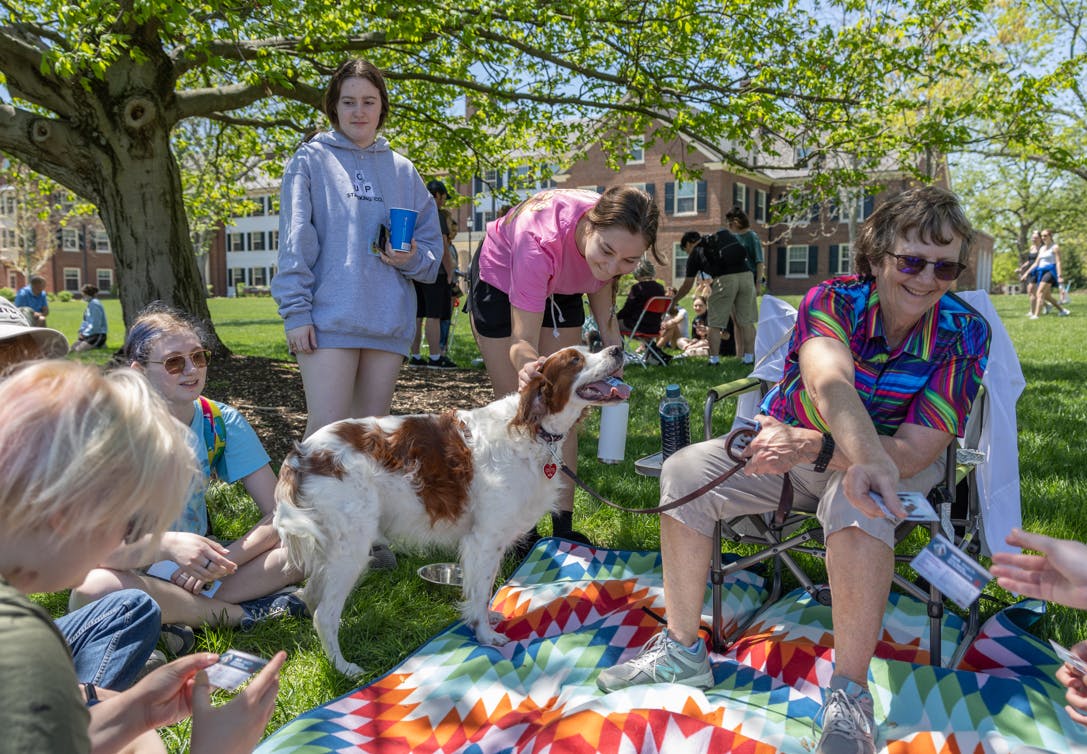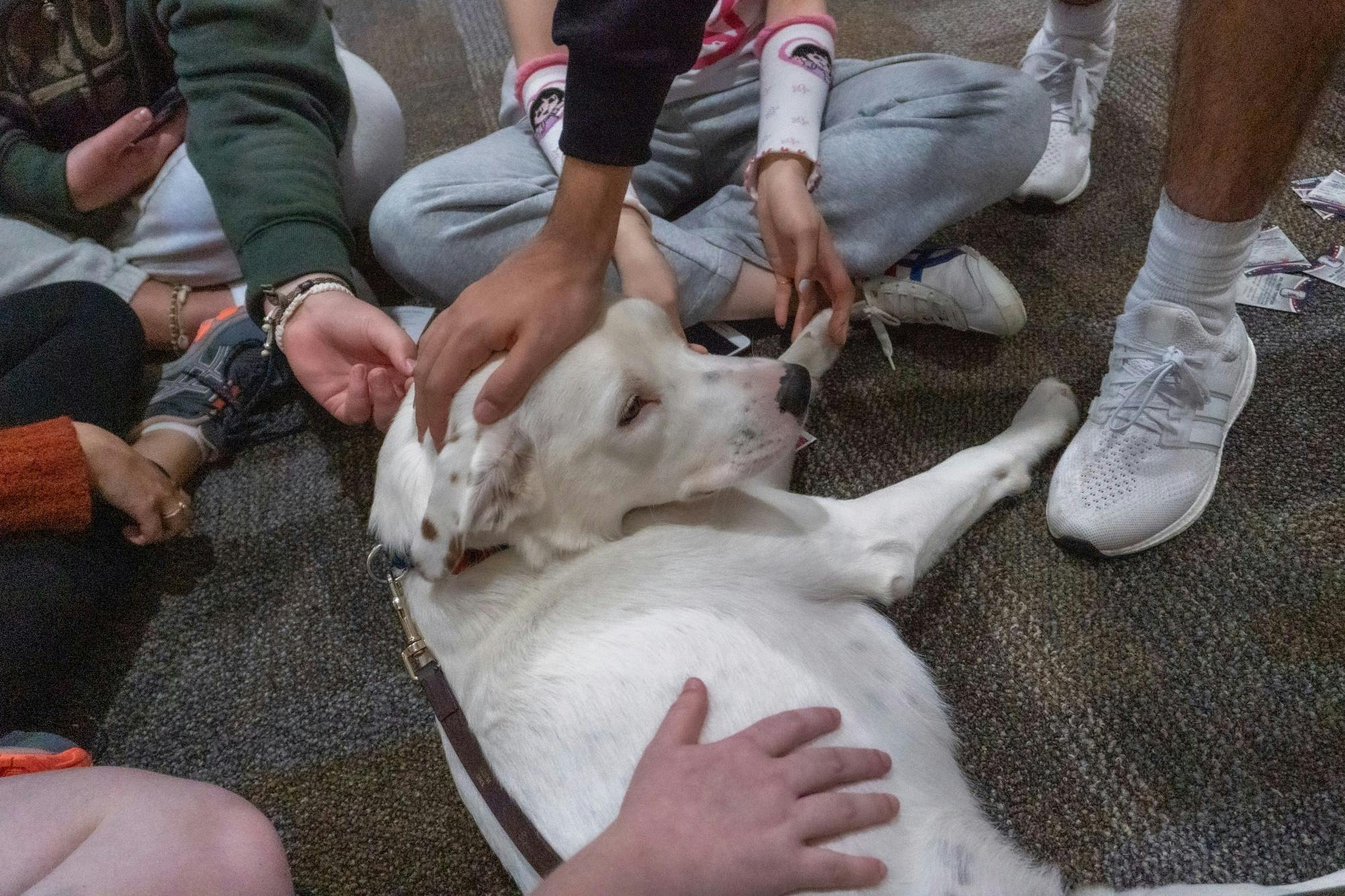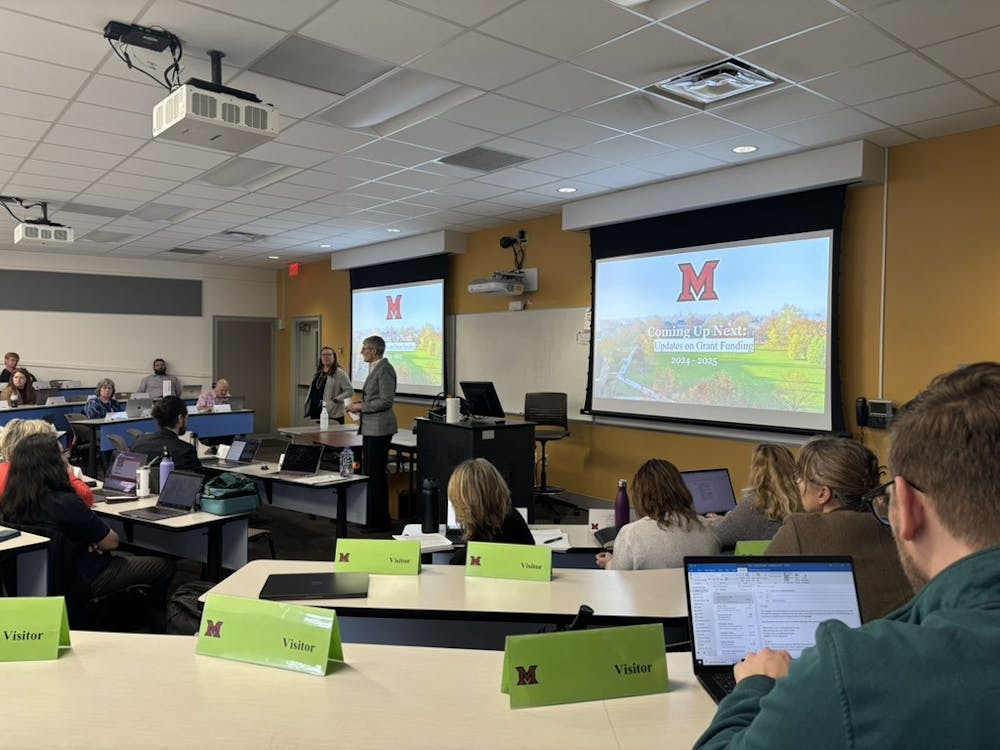The Student Counseling Service (SCS) at Miami University offers a variety of therapeutic approaches to their students — from cognitive behavioral therapy to group sessions to rubbing canine bellies.
Dog therapy has risen in popularity across the country and continues to grow at Miami as well. Specially trained and certified, these four-legged therapists have more to offer than being cute and good at cuddling.

Renate Crawford sometimes brings the beloved Newton Crawford to dog therapy.
Miami began offering dog therapy in 2008. Mary O’Leary, now the lead dog handler for the program, worked in the athletic department at the time. After seeing student reactions when she brought her dog to work with her, approached SCS with a proposal.
“In the first few years, it was Mary visiting a few meetings, going to a few different residence halls,” Melanie Uy, the dog therapy coordinator for SCS, said. “We then started to grow into weekly drop-in sessions [at SCS] which over the past year and a half, we’ve now doubled that, so we have it twice a week now.”
In her first year as a handler at Miami, O’Leary brought her dog, Sugar, to a sexual assault counseling clinic, where she noticed that one girl appeared especially impacted by trauma.
“She sat with her back against the wall, knees to her chest, she didn’t want to interact with anybody,” O’Leary said. “She kept pushing the dog away, but Sugar’s the type of dog that doesn’t allow people to ignore her.”
Despite the girl’s evasions, Sugar kept coming back to her. After a few attempts, the dog playfully placed her nose on the girl’s water bottle, and turned her head sideways.
“She looked up into her eyes and made her smile,” O’Leary said. “The counselor and I both looked at each other and started laughing … she was gonna get to her one way or another.”

Mary O'Leary leads the dog therapy program at Miami.
That girl ended up returning to dog therapy every Monday until she graduated. O’Leary said as soon as the girl entered the building, not even in the room yet, Sugar’s tail would begin wagging.
“‘I’m always gonna be here for you,’ that was basically what she was saying,” O’Leary said. “You never know how your dogs are gonna affect [others], and I don’t even try to guess anymore.”
Enjoy what you're reading?
Signup for our newsletter
In addition to bi-weekly sessions, the program also holds events in Armstrong for midterms and finals, as well as by-request visits to residence halls, faculty groups, classrooms and student organizations.
Uy said dog therapy offers many benefits and can be effective at lowering stress and making students feel connected.
“There’s research behind interactions with animals, specifically dogs and mini horses,” Uy said. “They’ve done physiological markers, like it decreases heart rates, breathing rates normalize … even by just bringing smiles to faces and laughing.”
Caylee Bunker, a first-year biology major, said she has noticed the stress-relieving benefits herself.
“I had a dog at home, and he would always cheer me up, so it’s nice to come see the dog here,” Bunker said. “He’s very friendly so it’s just relaxing and nice to not be stressed about anything.”

Dogs like Okie can bring a sense of familiarity to college students who have moved away from home.
Uy noted that dog therapy can be especially helpful for college students.
“A majority have moved away from home, from their pets, they don't have their family and so they look for comfort, they look for some sense of familiarity,” Uy said. “Coming to a dog therapy event can remind them of what is back home waiting for them, make them feel like they’re connected here and have something they’re excited about.”
Lily Cunningham, a first-year psychology major, attended dog therapy for the first time on Sept. 19 and plans to start going weekly.
“I used to have a dog – it always relieved my stress when I got to spend time with him,” Cunningham said. “So I just thought it would be a nice little way to break up my Monday by spending time with a dog.”
The program, one of the most popular before the COVID-19 pandemic, has seen attendance increase since in-person sessions resumed in fall 2021.
“[Dog therapy] has provided a lot of support and connectedness,” Uy said. “It’s been something that people look forward to. It’s a great way to connect with people, friends around you, classmates you’ve never met … it’s only going up and up.”
The bi-weekly dog therapy sessions are held in Harris Hall on Mondays from 2-3 p.m. and Thursdays from 3-4 p.m. SCS will also be holding a Therapy Dog Day on Monday, Oct. 3 from 1-4 p.m. at Central Quad to help students destress during midterms.




